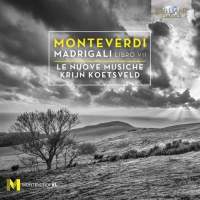Texte paru dans: / Appeared in: |
|
|
Outil de traduction ~ (Très approximatif) |
|
|
Reviewer: J.
F. Weber This ensemble’s first recording was a pairing of Books 5 and 6 of Monteverdi madrigals (Fanfare 32:6). It follows up with a similar offering for the same label. Book 7, however, is not a collection of five-voice madrigals like the composer’s first six books; it was published under the title “Concerto” and it consists of a variety of secular vocal works in every form except the five-voice madrigal, surely a conscious choice. Every work contained in the book had had numerous single recordings even before Raymond Leppard’s set, notably Tirsi e Clori, the ballo that concludes the published book, the longest single piece. This is the fifth complete set of Book 7, preceded by Leppard (3:2), Roberto Gini (14:1), Claudio Cavina (26:4), and Marco Longhini (32:4), the preceding versions being compared in detail in the last review. Cavina’s version, beautifully sung and nicely packaged, was praised when new. Longhini’s total timing (162:45) was 15 percent slower than the two versions that preceded it (Cavina’s 136:14 and Gini’s 135:23), typical of all his Monteverdi sets, but it was sung from his own new edition, the first since Malapiero’s. As Longhini notes, he prefers expression and harmonic subtlety over speed and agility. This gave him an important advantage over the otherwise excellent version of Cavina in the first and only complete set (Books 1 to 9) of this music (the Naxos release of Longhini’s completion of his set is overdue). Cavina’s is the only set that is laid out in random order (Leppard departed only slightly from the published order). It is interesting to note that Leppard’s timing of 131:29 was marginally faster than Gini and Cavina, but Koetsveld’s 127:13 reverses the progression toward ever slower total timings. Koetsveld’s tempos may sound reasonable until they are compared one piece at a time with Longhini, paying close attention to the text (or translation, depending on your preference). Then, even if you can’t hear the differences in Longhini’s carefully corrected new edition (using all the original sources), his interpretations will be convincing. This is not to deny that Koetsveld has a good ensemble that sings and plays well; his sound is captured elegantly. Without comparison with any other version, it can satisfy a need for this music. If you have not acquired any previous version, you may be satisfied with this one. | |
|
|
|
|
Cliquez l'un ou l'autre
bouton pour découvrir bien d'autres critiques de CD |
|




